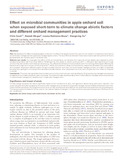JavaScript is disabled for your browser. Some features of this site may not work without it.
| dc.contributor.author | Cook, Chris | |
| dc.contributor.author | Magan, Naresh | |
| dc.contributor.author | Robinson-Boyer, Louisa | |
| dc.contributor.author | Xu, Xiangming | |
| dc.date.accessioned | 2023-02-15T15:05:53Z | |
| dc.date.available | 2023-02-15T15:05:53Z | |
| dc.date.issued | 2023-01-11 | |
| dc.identifier.citation | Cook C, Magan N, Robinson-Boyer L, Xu X. (2023) Effect on microbial communities in apple orchard soil when exposed short-term to climate change abiotic factors and different orchard management practices, Journal of Applied Microbiology, Volume 134, Issue 3, March 2023, Article Number lxad002 | en_UK |
| dc.identifier.issn | 1364-5072 | |
| dc.identifier.uri | https://doi.org/10.1093/jambio/lxad002 | |
| dc.identifier.uri | https://dspace.lib.cranfield.ac.uk/handle/1826/19207 | |
| dc.description.abstract | Aim We assessed the effect of exposing apple orchard soil to different temperatures and CO2 levels on the resident microbiome of soils from a conventionally managed and an organically managed apple orchard. The key difference between these two orchards was that synthetic fertilizers and pesticides are routinely used in the former one. Methods and results To investigate the effect of CO2 and temperature soil samples from each site at two depths were exposed to elevated temperature (29°C) at either 5,000 or 10,000 ppm for 5 weeks or control conditions (25°C + 400 ppm). Both bacterial and fungal communities were profiled with amplicon-sequencing. The differences between the two orchards were the most significant factor affecting bacterial and fungal communities contributing to 53.7% and 14.0% of variance in Bray-Curtis β diversity respectively. Elevated CO2 concentration and increased temperature affected organic orchard microbial diversity more than the conventionally managed orchard. A number of candidate beneficial and pathogenic microorganisms had differential abundance when temperature and CO2 were elevated, but their effect on the plant is unclear. Conclusions This study has highlighted that microbial communities in bulk soils are most significantly influenced by crop management practice compared to the climate conditions used in the study. The studied climate conditions had a more limited effect on microbial communitiy diversity in conventionally managed soil samples than in organically managed soils. | en_UK |
| dc.description.sponsorship | Biotechnology and Biological Sciences Research Council (BBSRC); Collaborative Training Partnerships (CTP) for Fruit Crop Research; NIAB EMR | en_UK |
| dc.language.iso | en | en_UK |
| dc.publisher | Oxford University Press | en_UK |
| dc.rights | Attribution 4.0 International | * |
| dc.rights.uri | http://creativecommons.org/licenses/by/4.0/ | * |
| dc.subject | Soil | en_UK |
| dc.subject | Climate Change | en_UK |
| dc.subject | Apple Replant Disease | en_UK |
| dc.subject | Microbiome | en_UK |
| dc.subject | Top Fruit | en_UK |
| dc.subject | Apple | en_UK |
| dc.title | Effect on microbial communities in apple orchard soil when exposed short-term to climate change abiotic factors and different orchard management practices | en_UK |
| dc.type | Article | en_UK |
| dc.identifier.eissn | 1365-2672 |
Files in this item
The following license files are associated with this item:
This item appears in the following Collection(s)
-
Staff publications (SWEE) [2825]

